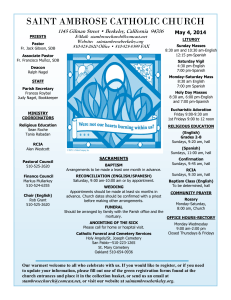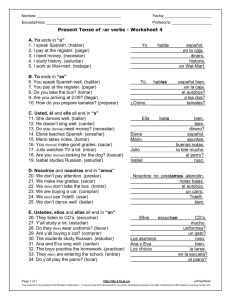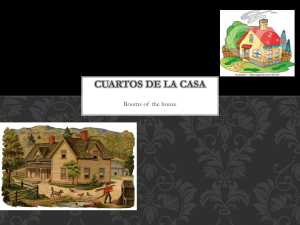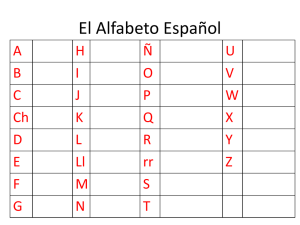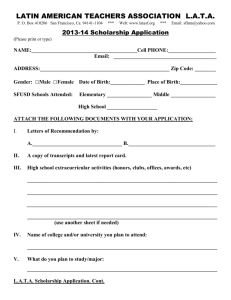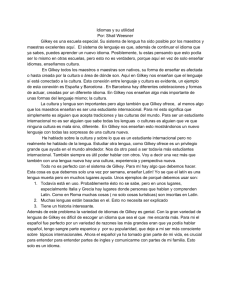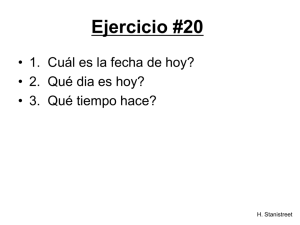Margie A. Soehl, Attorney At Law
advertisement
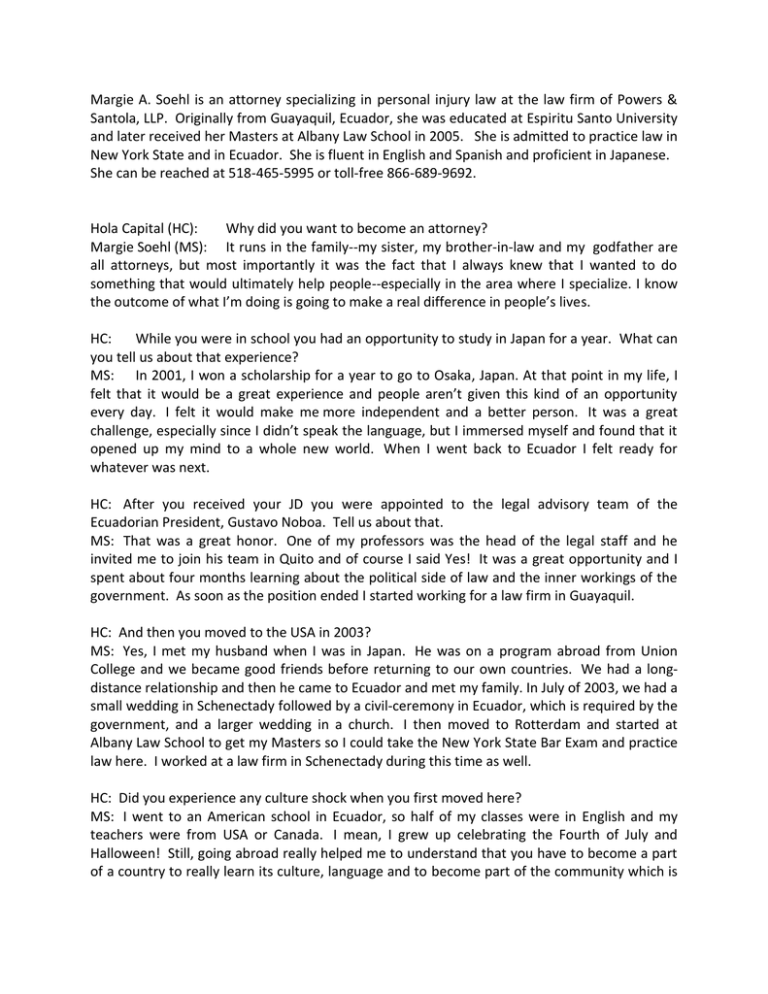
Margie A. Soehl is an attorney specializing in personal injury law at the law firm of Powers & Santola, LLP. Originally from Guayaquil, Ecuador, she was educated at Espiritu Santo University and later received her Masters at Albany Law School in 2005. She is admitted to practice law in New York State and in Ecuador. She is fluent in English and Spanish and proficient in Japanese. She can be reached at 518-465-5995 or toll-free 866-689-9692. Hola Capital (HC): Why did you want to become an attorney? Margie Soehl (MS): It runs in the family--my sister, my brother-in-law and my godfather are all attorneys, but most importantly it was the fact that I always knew that I wanted to do something that would ultimately help people--especially in the area where I specialize. I know the outcome of what I’m doing is going to make a real difference in people’s lives. HC: While you were in school you had an opportunity to study in Japan for a year. What can you tell us about that experience? MS: In 2001, I won a scholarship for a year to go to Osaka, Japan. At that point in my life, I felt that it would be a great experience and people aren’t given this kind of an opportunity every day. I felt it would make me more independent and a better person. It was a great challenge, especially since I didn’t speak the language, but I immersed myself and found that it opened up my mind to a whole new world. When I went back to Ecuador I felt ready for whatever was next. HC: After you received your JD you were appointed to the legal advisory team of the Ecuadorian President, Gustavo Noboa. Tell us about that. MS: That was a great honor. One of my professors was the head of the legal staff and he invited me to join his team in Quito and of course I said Yes! It was a great opportunity and I spent about four months learning about the political side of law and the inner workings of the government. As soon as the position ended I started working for a law firm in Guayaquil. HC: And then you moved to the USA in 2003? MS: Yes, I met my husband when I was in Japan. He was on a program abroad from Union College and we became good friends before returning to our own countries. We had a longdistance relationship and then he came to Ecuador and met my family. In July of 2003, we had a small wedding in Schenectady followed by a civil-ceremony in Ecuador, which is required by the government, and a larger wedding in a church. I then moved to Rotterdam and started at Albany Law School to get my Masters so I could take the New York State Bar Exam and practice law here. I worked at a law firm in Schenectady during this time as well. HC: Did you experience any culture shock when you first moved here? MS: I went to an American school in Ecuador, so half of my classes were in English and my teachers were from USA or Canada. I mean, I grew up celebrating the Fourth of July and Halloween! Still, going abroad really helped me to understand that you have to become a part of a country to really learn its culture, language and to become part of the community which is very important. You learn respect and tolerance and that everybody has a different point of view. HC: Has the growth of the Latino community in the Capital District affected you professionally? MS: Absolutely. When I came to upstate NY in 2003 every now and then I might hear someone speaking Spanish, but now it’s an everyday thing. I get a lot of phone calls from Spanishspeaking clients telling me they’re glad they found me because there are many law firms that wouldn’t even speak with them since they couldn’t understand them. If I can’t take a particular case, I can at least guide them to the right person who can give them advice. Being able to speak the same language and having a cultural connection gives me and my clients an important basic comfort level that helps to put them at ease because they know they are being heard and understood. A Spanish-speaking client may relate to me better because that’s my native language and that’s where I come from, too, so I can understand better how they feel and what are they going through. It’s not just about listening to their story and figuring out if there’s a case, it’s about being a human being who wants to help someone who is going through a hard time in their life. HC: You specialize in serious and catastrophic injuries. How did you pick this area of law? MS: Working in Schenectady, I had a great opportunity to experience a variety of areas of law and I was attracted by the personal injury part because these are people who have been through a trauma and I have a chance to make their lives better. For example, I can’t bring back their loved ones or fix their injuries, but the money they may recover helps improve their lives and their outlook. I know I am making a real difference for people who are going through a tough time. HC: You offer free initial consultations? MS: Yes. HC: What types of cases do you work on? MS: Injury law includes all sorts of areas, including failure to diagnose cancer, car accidents, children suffering from birth injuries, legal malpractice and medical malpractice. A part that is particularly important to the Latino community is workplace accidents and construction site accidents. New York has specific statutes for construction law. There is a big Latino community that works at construction sites who may not know that they are provided with specific protections beyond Workers Compensation. Many Latino workers don’t know that the law doesn’t discriminate if you’re legal or illegal if you are hurt and sometimes you are entitled to more compensation for your injuries than just Workers’ Comp. It’s very important that people are made aware of these protections and that your immigration status is not a factor when you are injured on a construction site. This type of law is extremely specialized so not all attorneys have our experience or resources in this area. In fact, Daniel Santola, a Senior Partner in my firm, wrote the book on NY Construction Law. This is our specialty, so I don’t think it makes sense to go anywhere else! HC: What advice can you give to people about selecting the right attorney? MS: My best advice is that you may be used to seeing lawyers in commercials, but you have to select a lawyer who has the qualifications, experience and resources to best represent you and your specific situation. Use the internet and do your research. For example, we have detailed articles on cancer misdiagnosis and construction law on our websites that you can read to help you understand and prepare yourself for when you actually meet with the lawyer. HC: What is your vision for your future? MS: Hopefully I’ll still be working at Powers and Santola--I really love working there. I also want to be more immersed in the Latin community and I want to continue to work on cases where I can make a difference for Latinos. I just hope to continue to have the opportunity to make a difference in people’s lives. Margie lives in Rotterdam with her husband and two children. -----Margie A. Soehl es una abogada que se especializa en daños y perjuicios en la firma de abogados de Powers & Santola, LLP. Nacida en Guayaquil, Ecuador, Margie estudió derecho en la Universidad Espíritu Santo y luego recibió su Maestría en Albany Law School en el 2005. Habla con fluidez el Inglés y Español y domina el japonés. Contáctese con Margie al 518-465-5995 o al número gratuito 866-689-9692. Hola Capital (HC): ¿Por qué decidiste ser abogada? Margie Soehl (MS): En mi familia hay muchos abogados - mi hermana, mi cuñado y mi padrino son abogados, pero sobretodo siempre supe que quería hacer algo que en última instancia, ayudaría a personas - especialmente en el área en la cual me especializo. Sé que el resultado de lo que estoy haciendo va a hacer una diferencia en la vida de mis clientes. HC: Mientras estudiabas Derecho tuviste la oportunidad de estudiar en Japón durante un año. ¿Qué puedes decirnos sobre esa experiencia? MS: En el 2001, me gané una beca por un año para ir a Osaka, Japón. En ese momento en mi vida, estaba conciente de que sería una gran experiencia y que este tipo de oportunidades no se dan todos los días . Sentí que me haría más independiente y una mejor persona. Fue un gran desafío, sobre todo porque yo no hablaba el idioma, pero aproveché esta experiencia y encontré un mundo completamente nuevo. Cuando regresé a Ecuador me sentí lista para cualquier desafío. HC: Después de que se recibió como abogada fue nombrada parte del equipo de asesoría jurídica del Presidente de Ecuador, Gustavo Noboa. Cuéntanos acerca de eso. MS: Eso fue un gran honor. Uno de mis profesores era el asesor jurídico y él me invitó a formar parte del staff jurídico en Quito y acepté su propuesta. Fue una gran oportunidad y pase cuatro meses aprendiendo sobre el aspecto político y el funcionamiento interno del gobierno. Tan pronto como la posición terminó empecé a trabajar para un bufete de abogados en Guayaquil. HC: Y luego se mudó a los EE.UU. en 2003? MS: Sí, conocí a mi esposo cuando estaba en Japón. Él estaba en un programa en el extranjero de Union College y nos hicimos buenos amigos antes de regresar a nuestros países. Tuvimos una relación de larga distancia y luego él visitó Ecuador y conoció a mi familia. En Julio del 2003, tuvimos una boda pequeña en Schenectady seguida por una ceremonia civil en el Ecuador lo cual es requerido por el gobierno y luego una boda más grande con mi familia en una iglesia. Luego nos mudamos a Rotterdam e inicié mis estudios en Albany Law School para obtener mi maestría y así poder tomar el examen para ser admitida como abogada en el estado de Nueva York y poder ejercer como abogada. Durante mis estudios, trabajé en un bufete de abogados en Schenectady. HC: ¿Experimentó algún choque cultural cuando se mudó aquí? MS: Yo fui a una escuela americana en el Ecuador. La mitad de mis clases eran en Inglés y mis profesores eran de EE.UU. y Canadá. Crecí celebrando el Cuatro de Julio y Halloween! Sin embargo, el tiempo que estuve en el extranjero me ayudó a entender que al país que uno fuere, se debe lograr formar parte de este a fin de realmente aprender su cultura, idioma y convertirse en parte de la comunidad lo cual es muy importante. Se debe tener respeto y tolerancia y entender que cada persona tiene un punto de vista diferente. HC: ¿El crecimiento de la comunidad latina en el Distrito de la Capital la ha afectado a usted profesionalmente? MS: Por supuesto. Cuando llegué al norte de Nueva York en el 2003 de vez en cuando escuchaba a alguien hablar en español, pero ahora es algo cotidiano. Recibo muchas llamadas telefónicas de clientes que solo hablan español quienes me dicen que están contentos de haberme encontrado, porque hay muchos bufetes de abogados que ni siquiera hablan con ellos, ya que no los pueden entender. Si no puedo tomar el caso de ellos en particular, por lo menos puedo guiarlos a la persona adecuada que los podría ayudar. El hablar el mismo idioma y tener esa conexión cultural les da a mis clientes un nivel de comodidad básica que los ayuda porque saben que están siendo escuchados y comprendidos. Un cliente que habla español puede comunicarse mejor conmigo, porque esa es mi lengua materna y es de donde yo vengo. Puedo entender cómo se sienten y lo que están pasando. No se trata sólo de escuchar su historia y averiguar si hay un caso legal, se trata de ser un ser humano que quiere ayudar a alguien que está pasando por un momento difícil en su vida. HC: Se especializan en lesiones serias y catastróficas. ¿Cómo elegiste esa área de derecho? MS: Cuando trabaje en Schenectady tuve una gran oportunidad de aprender sobre diferentes áreas del derecho y me sentí atraída por la parte de lesiones personales debido a que estas son personas que han pasado o están pasando por una situación difícil y tengo la oportunidad de mejorar sus vidas. Por ejemplo, no puedo traer de vuelta a sus seres queridos o corregir sus lesiones, pero el dinero que pueden recuperar ayuda a mejorar sus vidas. HC: Se ofrecen consultas iniciales gratis? MS: Sí. HC: ¿Qué tipos de casos son tu especialidad? MS: Daños y perjuicios incluye varias áreas, incluyendo casos en los cuales no se ha diagnosticado un cáncer a tiempo, los accidentes de carros, niños que sufren lesiones durante el parto, negligencia legal y negligencia médica. Una parte que es particularmente importante para la comunidad latina son los accidentes de trabajo y accidentes en sitios de construcción. Nueva York tiene leyes específicas para los accidentes de construcción. Hay una gran comunidad latina que trabaja en las obras de construcción que no tiene conocimiento que cuentan con protecciones específicas más allá de la Compensación a los Trabajadores. Muchos trabajadores latinos no saben que la ley no discrimina si son legales o ilegales, si usted se ha lesionado, en algunas instancias los trabajadores tienen derecho a una mayor compensación. Es muy importante que las personas conozcan de estas protecciones y que su estado migratorio no es un factor cuando se lesiona en un sitio de construcción. Este tipo de ley es muy especializada por lo que no todos los abogados tienen la experiencia ni los recursos en este ámbito. De hecho, Daniel Santola, un socio principal en mi bufete de abogados, escribió el libro sobre las leyes en Nueva York sobre accidentes de construcción. Esta es nuestra especialidad. HC: ¿Qué consejo puede darle a la gente sobre cómo seleccionar al abogado adecuado? MS: Mi mejor consejo es que de pronto las personas están acostumbradas a ver a abogados en comerciales de televisión, pero usted tiene que seleccionar al abogado que tenga las mejores credenciales, experiencia y recursos para que lo pueda representar a usted en su caso legal. Usen el Internet y hagan su investigación. Por ejemplo, en nuestra página web tenemos artículos detallados sobre diagnóstico de cáncer y accidentes de construcción que pueden leer para ayudarle a entender y prepararse para cuando se reúna con un abogado. HC: ¿Cuál es su visión para su futuro? MS: Me encanta trabajar en Powers & Santola, LLP así que espero seguir trabajando ahí. También quiero estar más inmersa en la comunidad latina y quiero seguir trabajando en los casos en que puedo hacer una diferencia para los latinos. Espero seguir teniendo la oportunidad de hacer una diferencia en la vida de las personas. Margie vive en Rotterdam con su esposo y sus dos hijos.
